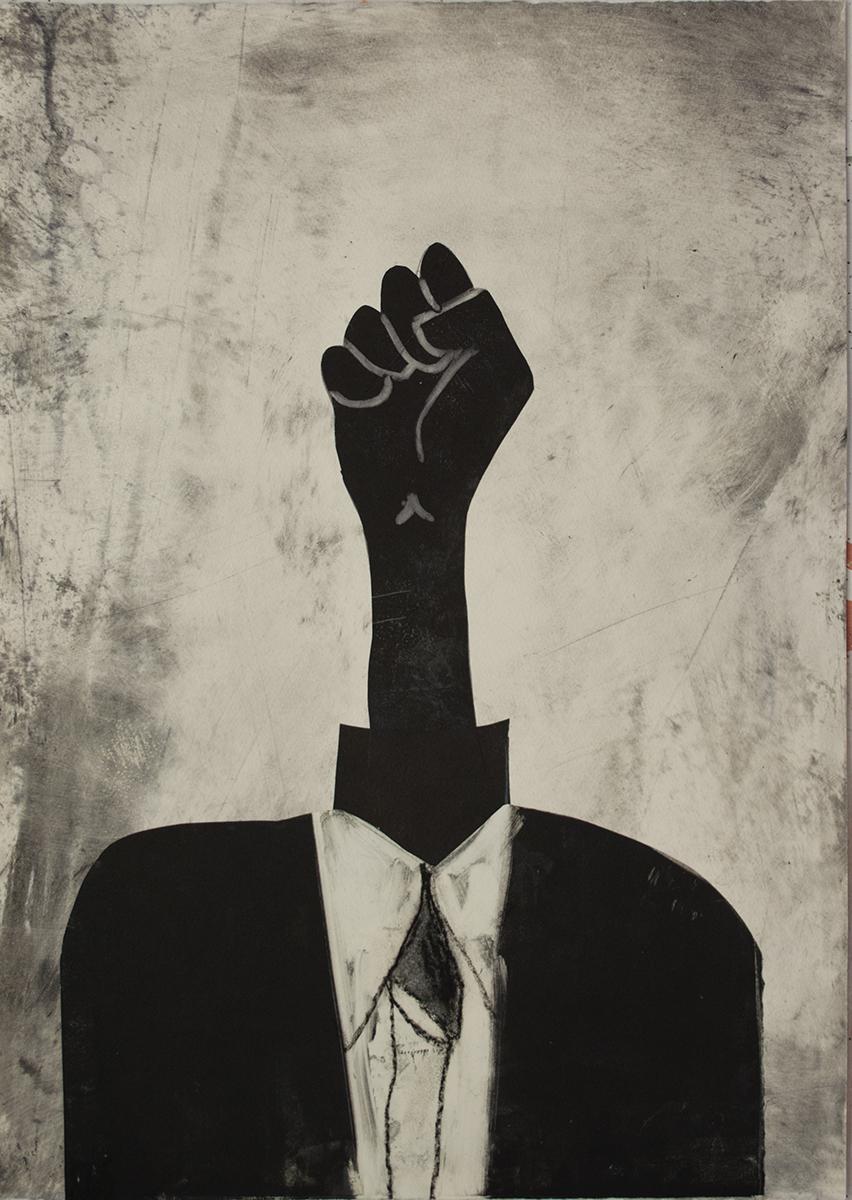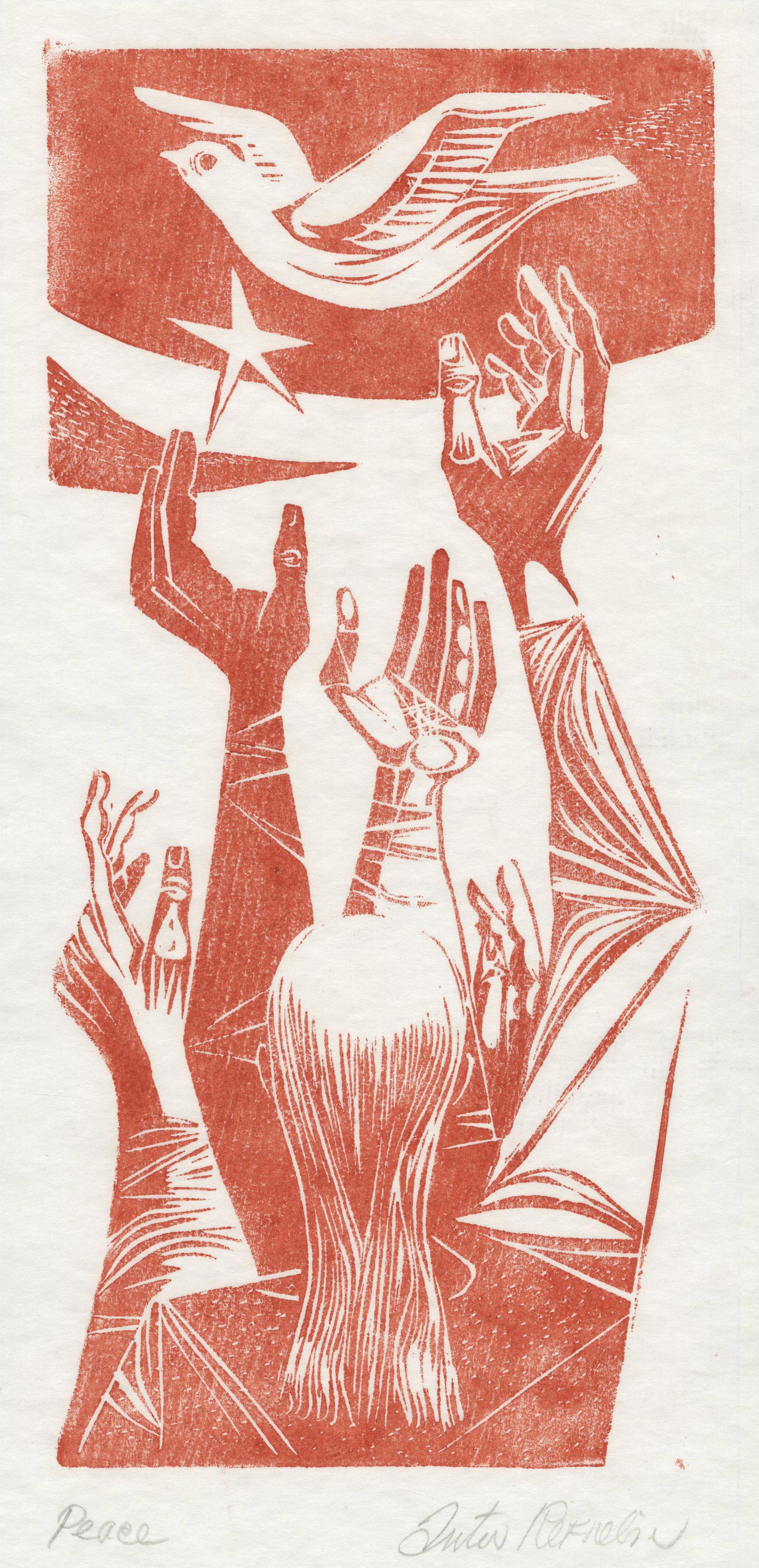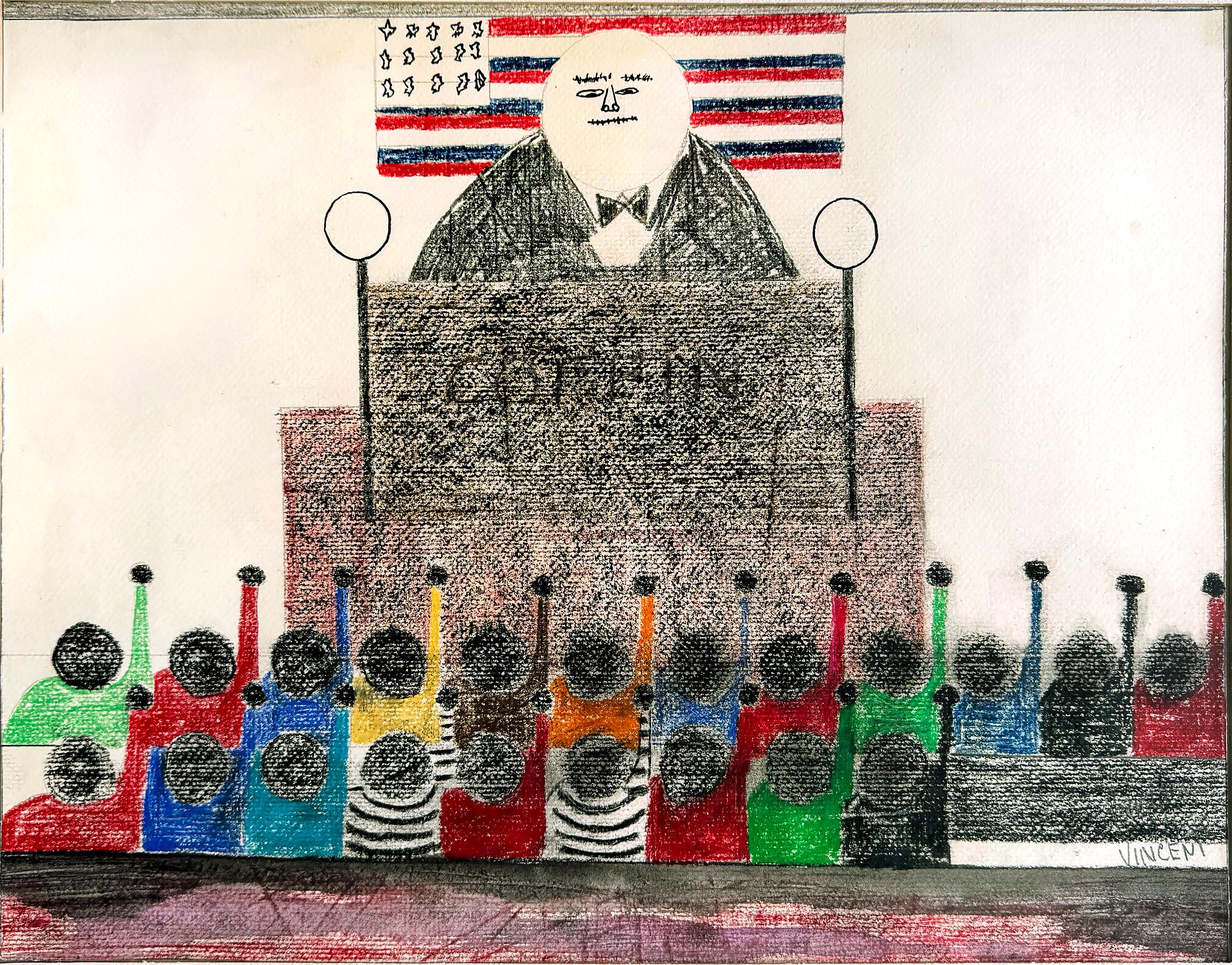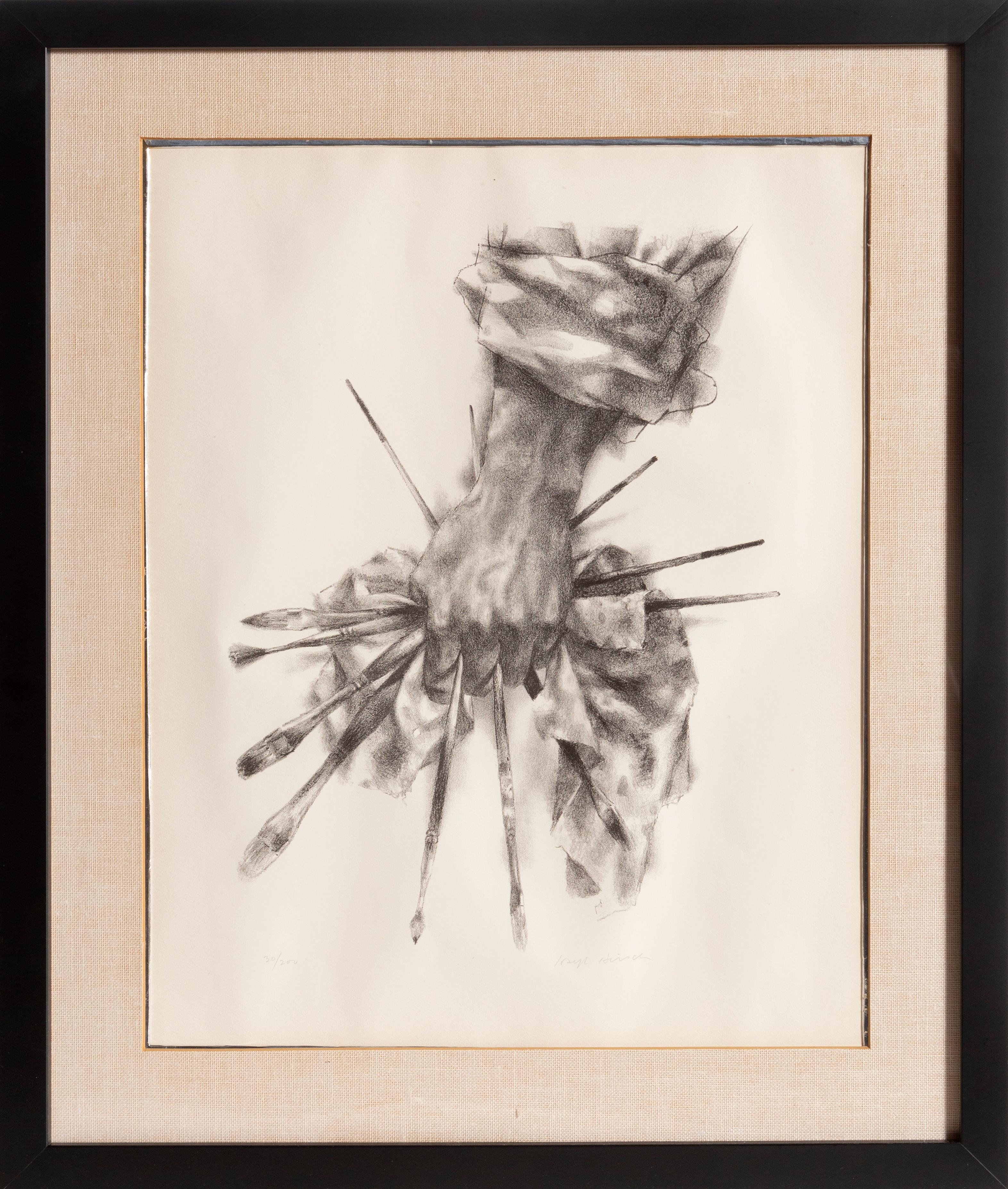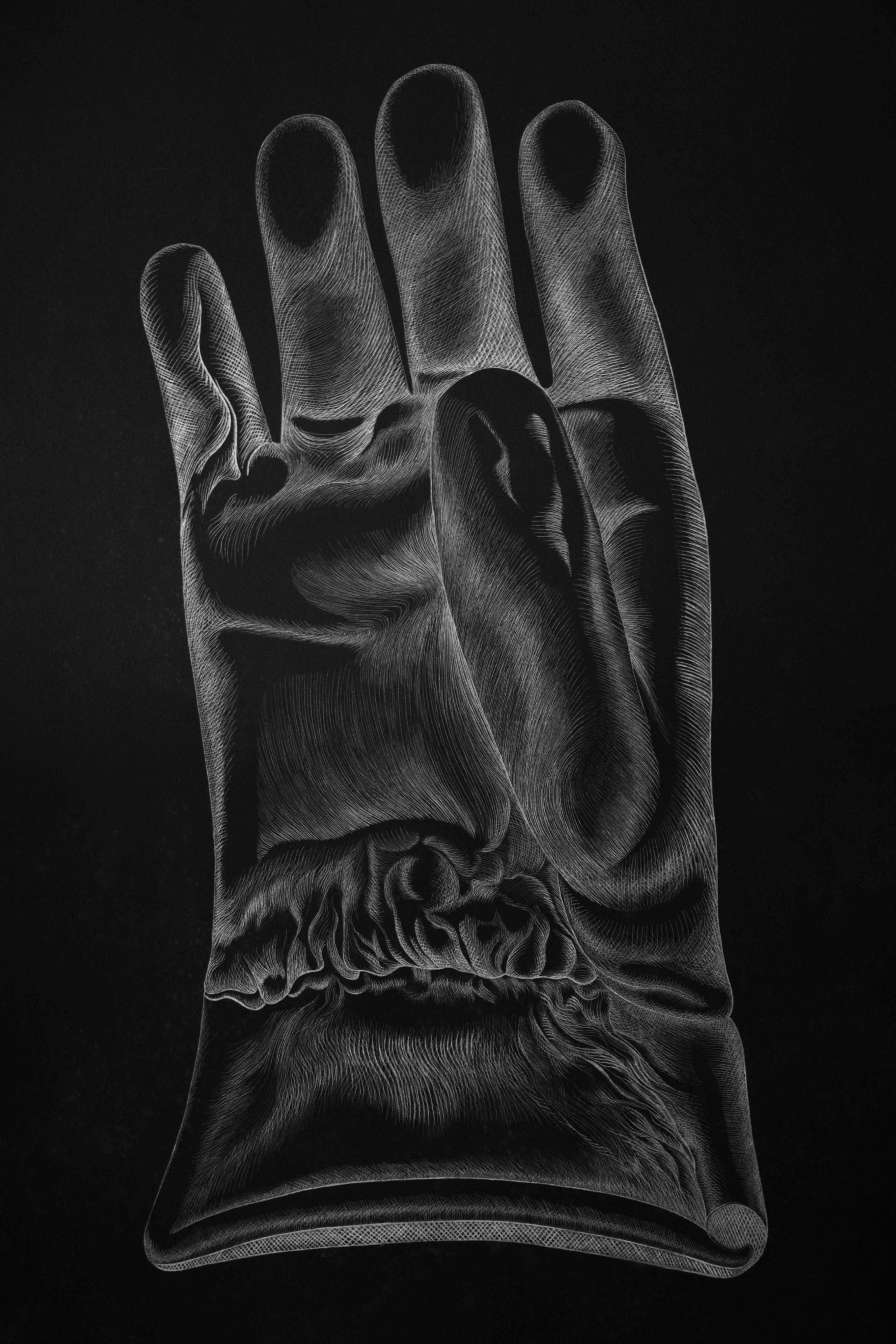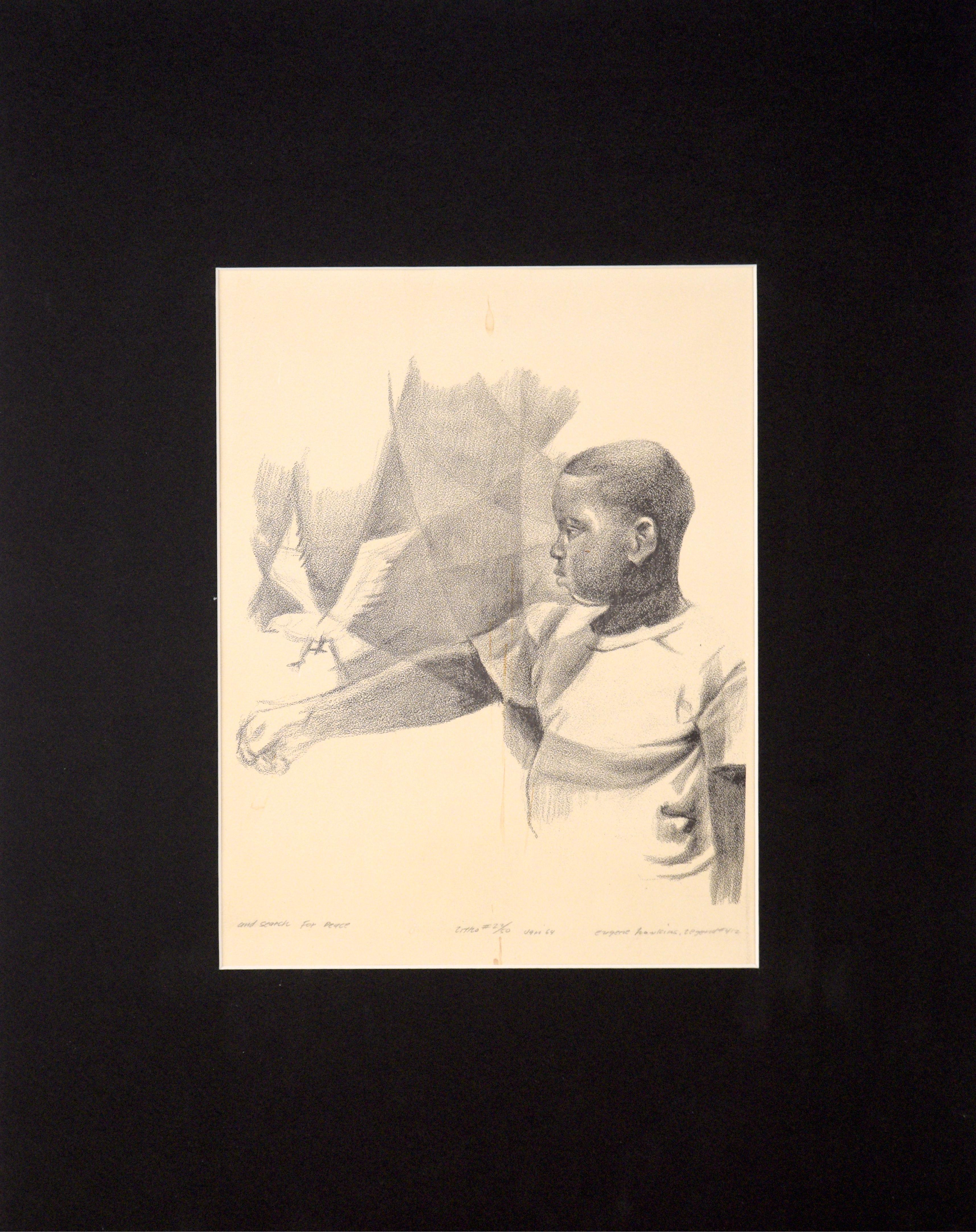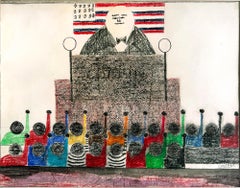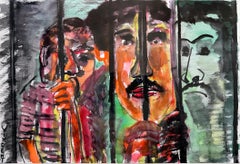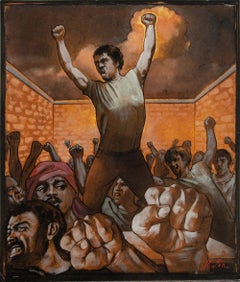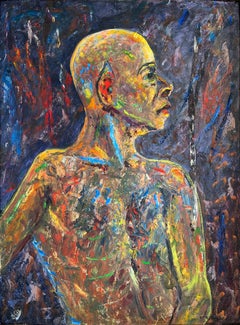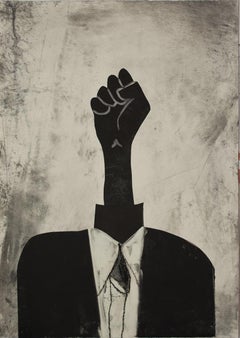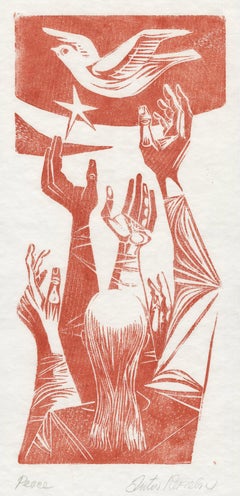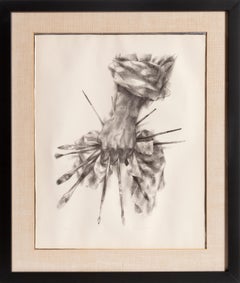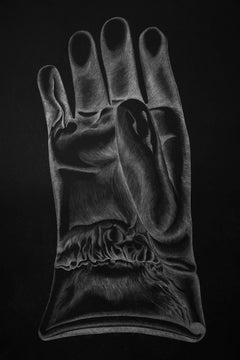Items Similar to Black Power Fist, Thumbs Up, Peace Sign - Hand Signals
Want more images or videos?
Request additional images or videos from the seller
1 of 15
Murray TinkelmanBlack Power Fist, Thumbs Up, Peace Sign - Hand Signals 1974
1974
$6,000
£4,557.49
€5,251.77
CA$8,449.49
A$9,367.50
CHF 4,922.99
MX$114,642.89
NOK 61,483.13
SEK 57,708.07
DKK 39,201.23
About the Item
Murray Tinkelman builds his works out of tiny meticulously placed cross hatchings that are organized into horizontal and diagonal structures. Most are done with a ruler and some freehand. As the viewer gets a closer page, Tinkelman's true genius and high standard of excellence reveal themselves. The details of the work become profound abstractions in themselves. Every line has meaning. Not one line is out of place. One could call this a neo-Pointillism in black and white. Clearly, this artwork exemplifies Tinkelman's exceptional ability to create powerful artworks out of tiny strokes. Murray Tinkelman has received honors fromThe Society of Illustrators, the Art Directors Club of New York, and the Society of Publications Designers. He has published work in “Atlantic Monthly,” “The New York Times,” and “The Washington Post,” " The Atlantic" "The Saturday Evening Post " among others. He is in the permanent collections of the Brooklyn Museum, Delaware Art Museum, the International Photography Hall of Fame & Museum, New Britain Museum of American Art, and Norman Rockwell Museum.
Work is matted but not framed. Signed and dated lower right
- Creator:Murray Tinkelman (1979 - 2015, American)
- Creation Year:1974
- Dimensions:Height: 16.5 in (41.91 cm)Width: 11.25 in (28.58 cm)
- Medium:
- Movement & Style:
- Period:
- Condition:Mint.
- Gallery Location:Miami, FL
- Reference Number:1stDibs: LU38538630252
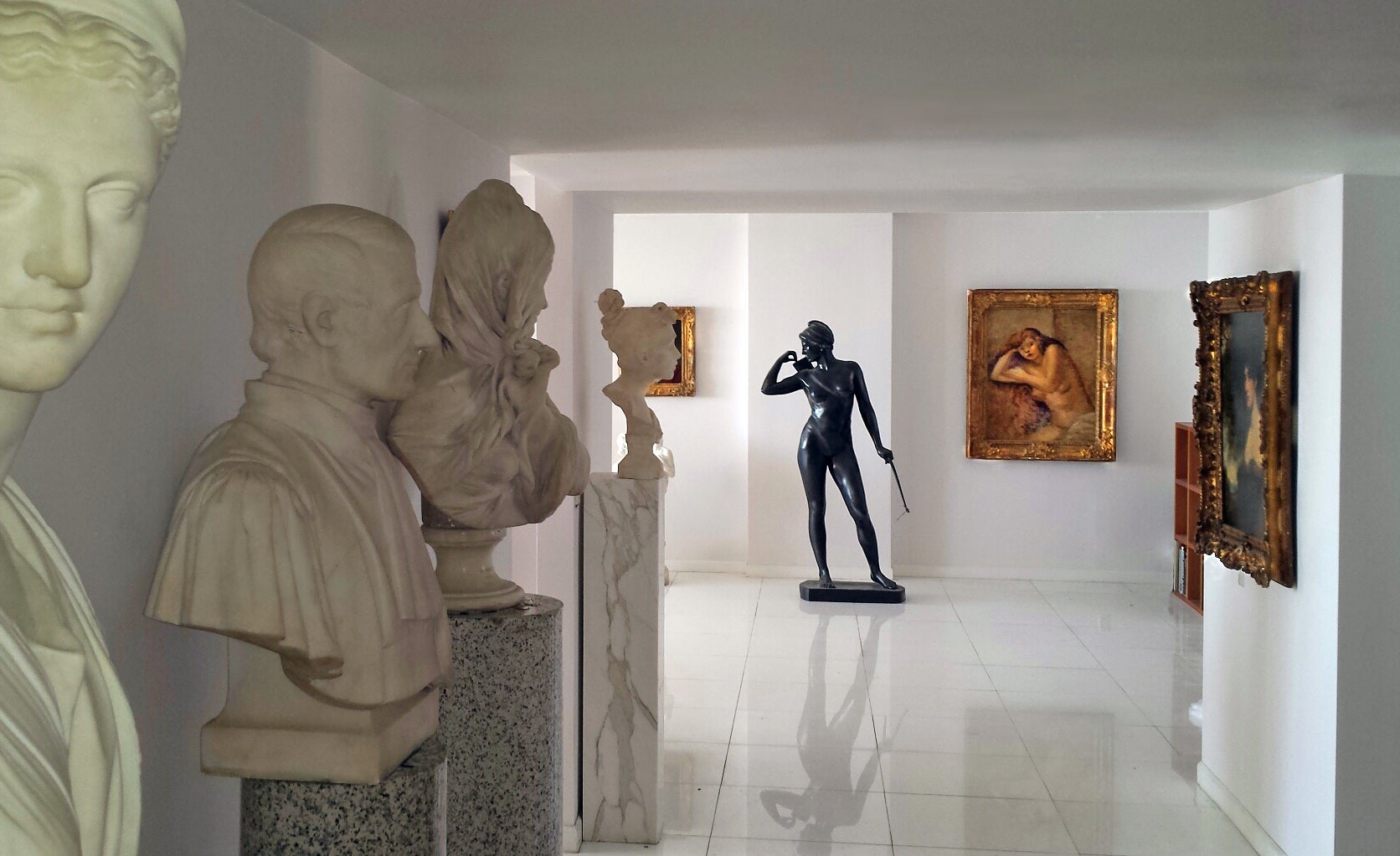
About the Seller
5.0
Gold Seller
Premium sellers maintaining a 4.3+ rating and 24-hour response times
Established in 2005
1stDibs seller since 2016
117 sales on 1stDibs
Typical response time: 1 hour
- ShippingRetrieving quote...Shipping from: Miami, FL
- Return Policy
Authenticity Guarantee
In the unlikely event there’s an issue with an item’s authenticity, contact us within 1 year for a full refund. DetailsMoney-Back Guarantee
If your item is not as described, is damaged in transit, or does not arrive, contact us within 7 days for a full refund. Details24-Hour Cancellation
You have a 24-hour grace period in which to reconsider your purchase, with no questions asked.Vetted Professional Sellers
Our world-class sellers must adhere to strict standards for service and quality, maintaining the integrity of our listings.Price-Match Guarantee
If you find that a seller listed the same item for a lower price elsewhere, we’ll match it.Trusted Global Delivery
Our best-in-class carrier network provides specialized shipping options worldwide, including custom delivery.More From This Seller
View AllBlack Panther Trials - Civil Rights Movement Police Violence African American
Located in Miami, FL
The Black Panther Trials - In this historically significant work, African American Artist Vicent D. Smith functions as an Art Journalist/ Court Reporter as much as a
Artist. Here, he depicts, in complete unity, 21 Black Panther Protestors raising their fist of defiance at the White Judge. Smith's composition is about utter simplicity, where the Black Panther Protestors are symmetrically lined up in a confrontation with a Judge whose size is exaggerated in scale. Set against a stylized American Flag, the supercilious Judge gazes down as the protesters as their fists thrust up. Signed Vincent lower right. Titled Panter 21. Original metal frame. Tape on upper left edge of frame. 255 . Panther 21. Framed under plexi.
_____________________________
From Wikipedia
In 1969-1971 there was a series of criminal prosecutions in New Haven, Connecticut, against various members and associates of the Black Panther Party.[1] The charges ranged from criminal conspiracy to first-degree murder. All charges stemmed from the murder of 19-year-old Alex Rackley in the early hours of May 21, 1969. The trials became a rallying-point for the American Left, and marked a decline in public support, even among the black community, for the Black Panther Party
On May 17, 1969, members of the Black Panther Party kidnapped fellow Panther Alex Rackley, who had fallen under suspicion of informing for the FBI. He was held captive at the New Haven Panther headquarters on Orchard Street, where he was tortured and interrogated until he confessed. His interrogation was tape recorded by the Panthers.[2] During that time, national party chairman Bobby Seale visited New Haven and spoke on the campus of Yale University for the Yale Black Ensemble Theater Company.[3] The prosecution alleged, but Seale denied, that after his speech, Seale briefly stopped by the headquarters where Rackley was being held captive and ordered that Rackley be executed. Early in the morning of May 21, three Panthers – Warren Kimbro, Lonnie McLucas, and George Sams, one of the Panthers who had come East from California to investigate the police infiltration of the New York Panther chapter, drove Rackley to the nearby town of Middlefield, Connecticut. Kimbro shot Rackley once in the head and McLucas shot him once in the chest. They dumped his corpse in a swamp, where it was discovered the next day. New Haven police immediately arrested eight New Haven area Black Panthers. Sams and two other Panthers from California were captured later.
Sams and Kimbro confessed to the murder, and agreed to testify against McLucas in exchange for a reduction in sentence. Sams also implicated Seale in the killing, telling his interrogators that while visiting the Panther headquarters on the night of his speech, Seale had directly ordered him to murder Rackley. In all, nine defendants were indicted on charges related to the case. In the heated political rhetoric of the day, these defendants were referred to as the "New Haven Nine", a deliberate allusion to other cause-celebre defendants like the "Chicago Seven".
The first trial was that of Lonnie McLucas, the only person who physically took part in the killing who refused to plead guilty. In fact, McLucas had confessed to shooting Rackley, but nonetheless chose to go to trial.
Jury selection began in May 1970. The case and trial were already a national cause célèbre among critics of the Nixon administration, and especially among those hostile to the actions of the FBI. Under the Bureau's then-secret "Counter-Intelligence Program" (COINTELPRO), FBI director J. Edgar Hoover had ordered his agents to disrupt, discredit, or otherwise neutralize radical groups like the Panthers. Hostility between groups organizing political dissent and the Bureau was, by the time of the trials, at a fever pitch. Hostility from the left was also directed at the two Panthers cooperating with the prosecutors. Sams in particular was accused of being an informant, and lying to implicate Seale for personal benefit.
In the days leading up to a rally on May Day 1970, thousands of supporters of the Panthers arrived in New Haven individually and in organized groups. They were housed and fed by community organizations and by sympathetic Yale students in their dormitory rooms. The Yale college dining halls provided basic meals for everyone. Protesters met daily en masse on the New Haven Green across the street from the Courthouse (and one hundred yards from Yale's main gate). On May Day there was a rally on the Green, featuring speakers including Jean Genet, Abbie Hoffman, Jerry Rubin, and John Froines (an assistant professor of chemistry at the University of Oregon). Teach-ins and other events were also held in the colleges themselves.
Towards midnight on May 1, two bombs exploded in Yale's Ingalls Rink, where a concert was being held in conjunction with the protests.[4] Although the rink was damaged, no one was injured, and no culprit was identified.[4]
Yale chaplain William Sloane Coffin stated, "All of us conspired to bring on this tragedy by law enforcement agencies by their illegal acts against the Panthers, and the rest of us by our immoral silence in front of these acts," while Yale President Kingman Brewster Jr. issued the statement, "I personally want to say that I'm appalled and ashamed that things should have come to such a pass that I am skeptical of the ability of a Black revolutionary to receive a fair trial anywhere in the U.S." Brewster's generally sympathetic tone enraged many of the university's older, more conservative alumni, heightening tensions within the school community.
As tensions mounted, Yale officials sought to avoid deeper unrest and to deflect the real possibility of riots or violent student demonstrations. Sam Chauncey has been credited with winning tactical management on behalf of the administration to quell anxiety among law enforcement and New Haven's citizens, while Kurt Schmoke, a future Rhodes Scholar, mayor of Baltimore, MD and Dean of Howard University School of Law, has received kudos as undergraduate spokesman to the faculty during some of the protest's tensest moments. Ralph Dawson, a classmate of Schmoke's, figured prominently as moderator of the Black Student Alliance at Yale (BSAY).
In the end, compromises between the administration and the students - and, primarily, urgent calls for nonviolence from Bobby Seale and the Black Panthers themselves - quashed the possibility of violence. While Yale (and many other colleges) went "on strike" from May Day until the end of the term, like most schools it was not actually "shut down". Classes were made "voluntarily optional" for the time and students were graded "Pass/Fail" for the work done up to then.
Trial of McLucas
Black Panther trial sketch...
Category
1970s American Modern Figurative Drawings and Watercolors
Materials
Watercolor, Pen, Pencil, Paper
Black Power, Attica Prison Riot Prisoners Racial Justice - African American Art
Located in Miami, FL
African American Artist Vincent D Smith makes a statement about racial justice. In this work from 1972, he depicts three African American prisoners with their faces pushed up agains...
Category
1970s Modern Figurative Drawings and Watercolors
Materials
Watercolor
Protest Revolt and Uprising illustration
By Daniel Maffia
Located in Miami, FL
This work is a quintessential protest statement piece depicting an angry mob brandishing powerful fits in the air in gestures of revolt
Signed lower right.
Daniel Maffia has done a ...
Category
1980s American Modern Figurative Paintings
Materials
Mixed Media, Gouache
Devil: No Horns, Burning in Hell, African American Harlem Renaissance
Located in Miami, FL
In a 1971 interview with Ebony Magazine, Alvin Hollinsworth commented on his African Jesus Christ painting, "I have always felt that Christ was a Blac...
Category
1970s Expressionist Figurative Paintings
Materials
Masonite, Oil
Civil Rights, Racial Justice Little Rock
By Philip Evergood
Located in Miami, FL
"Civil Rights." Evergood's early commentary on racial issues in the 1950s depicts four black men gagged, roped and hanging from a tree. In the background, imprisoned blacks look on through a barbed-wire fence. Whites watch in horror but do nothing to help. Meanwhile, a two-legged and three-headed serpent who symbolizes evil - wraps himself around the tree that physically and symbolically separates the races. This is an important work in the history of American art. It may be one of the very earliest examples of a major American painter doing a major work that challenges racial segregation and injustice at a time when no one else would. The title of the work is inspired by a Historic Supreme Court decision on racial segregation. The Little Rock...
Category
1950s American Realist Figurative Paintings
Materials
Oil
Untitled - Mysterious Figure in Black Pancho and Expressive Hands
Located in Miami, FL
Haunting yet beautiful with a simple graphic composition and monochromatic palette. The stylized and overly expressive hands are a hallmark of Kingman's style.
Hand-signed by artist...
Category
1960s Expressionist Portrait Paintings
Materials
Mixed Media, Oil
You May Also Like
Please exit, monoprint collage politics hand, figurative
Located in Brooklyn, NY
This monoprint transfer painting on paper bridges single printmaking and painting, with collage. The color palette is monochromatic. Thematically it is a figurative work referencing ...
Category
2010s American Modern Figurative Paintings
Materials
Archival Paper, Monoprint
Peace
By Anton Refregier
Located in Fairlawn, OH
Peace
Woodcut printed in orange red ink on japanese paper
Signed and titled in pencil lower right (see photo)
Titled lower left (see photo)
Created along with an illustrated book project Song of Peace, 1950-1959.
Condition: Excellent
Image: 10 1/2 x 4 7/8"
Sheet: 16 1/8 x 7";
Anton Refregier (March 20, 1905 – October 10, 1979) was a painter and muralist active in Works Progress Administration Federal Art Project commissions, and in teaching art. He was a Russian immigrant to the United States.
Among his best-known works is his mural series The History of San Francisco, located in the Rincon Center in downtown San Francisco, California. It depicts the city's history across twenty seven panels that he painted from 1940 to 1948.
Life and early career
Refregier was born in Moscow and emigrated to the United States in 1920. After working various odd jobs in New York City, he earned a scholarship to the Rhode Island School of Design in 1921. After finishing school, Refregier moved back to New York in 1925. To earn a living, Refregier worked for interior decorators, creating replicas of François Boucher and Jean-Honoré Fragonard paintings...
Category
1950s American Modern Figurative Prints
Materials
Woodcut
Artist's Hand, Framed Realist Lithograph by Joseph Hirsch
By Joseph Hirsch
Located in Long Island City, NY
Artist: Joseph Hirsch, American (1901 - 1981)
Title: Artist's Hand (Cole 51)
Year: 1966
Medium: Lithograph, signed and numbered in pencil
Edition: 30/200
Image Size: 19 x 15 inches
F...
Category
1960s American Realist Figurative Prints
Materials
Lithograph
Black Glove - Original Etching by Giacomo Porzano - 1972
By Giacomo Porzano
Located in Roma, IT
Hand signed by artist with pencil.
Artist's proof. Edition of 50 prints.
Category
1970s Contemporary Figurative Prints
Materials
Etching
"And Search for Peace" - Rare Signed Figurative Lithograph in Ink on Paper
Located in Soquel, CA
"And Search for Peace" - Rare Signed Figurative Lithograph in Ink on Paper
Bold lithograph by Eugene Hawkins (American, b. 1933). Rendered in a semi-abstracted style, a young, black boy holds out his arm for a dove, the symbol of peace to land.
Titled, numbered, dated, and signed along the bottom edge: "and search for peace litho #22/50 Jan 64 Eugene Hawkins, Legend #412"
Presented in a new black mat.
Mat size: 18"H x 14"W
Image size: 11"H x 8.75"W
Eugene Hawkins (American, b. 1933) is a BIPOC artist...
Category
1960s American Modern Figurative Prints
Materials
Paper, Ink, Lithograph
Glove - Etching by Giacomo Porzano - 1972
By Giacomo Porzano
Located in Roma, IT
Glove is a beautiful color etching on paper, realized in 1972 by the Italian artist Giacomo Porzano (1925-2006). Unique color variation.
Hand-signed and dated by Giacomo Porzano in ...
Category
1970s Contemporary Figurative Prints
Materials
Etching
More Ways To Browse
Vintage Peace Signs
Norman Rockwell Signed
Norman Rockwell Saturday Evening Post
Norman Rockwell Museum
Hand Fist
Hand Signed Norman Rockwell
Vintage Cross Pens
Military Prints
Framed Giclee Prints
Famous Photographs
Spiritual Paintings
Gold Framed Oil Painting
Vintage Painting Book
Women Photography
Numbered Picasso
Water Abstract Painting
Red White Blue Art
Paintings On White Background
